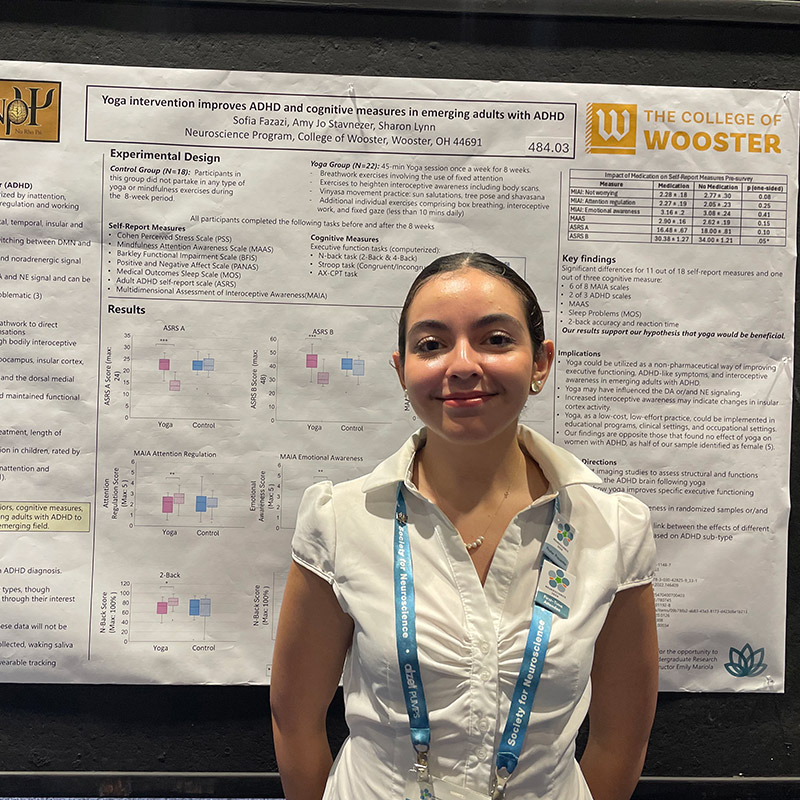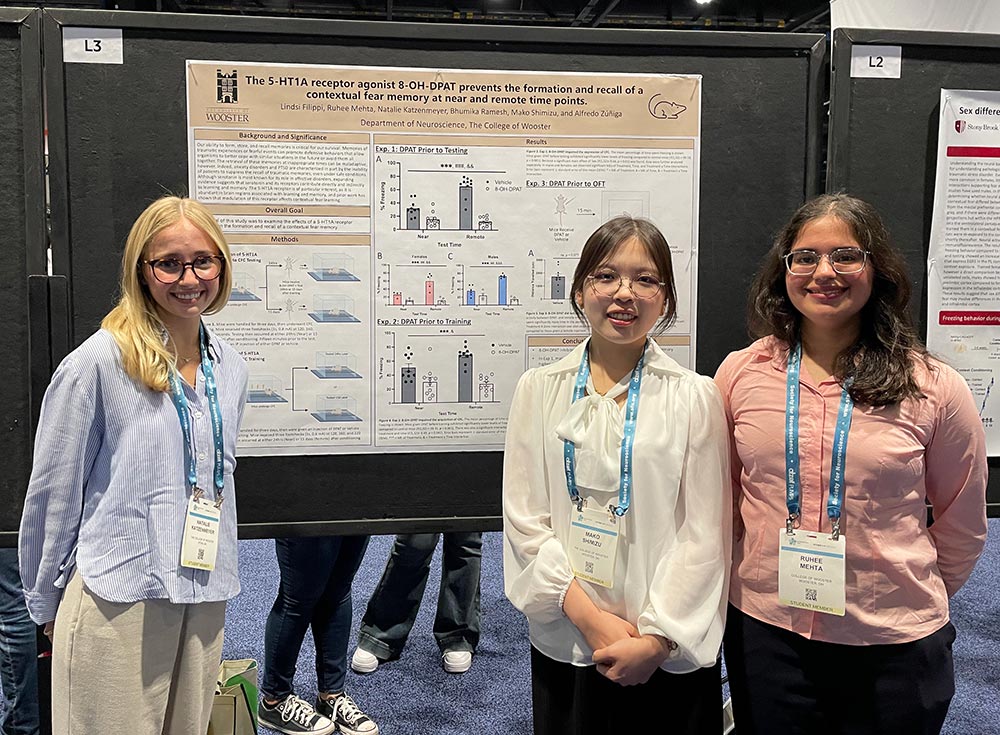
Wooster students present research at Society for Neuroscience annual meeting

Four students from The College of Wooster presented original research from their sophomore research and Independent Study projects at the Society of Neuroscience annual meeting Oct. 4-9 in Chicago, Illinois. Neuroscience majors Sofia Fazazi ’25, Mako Shimizu ’26, Ruhee Mehta ‘26, and Natalie Katzenmeyer ’26 attended the conference along with faculty Amy Jo Stavnezer, professor of neuroscience and psychology, and Alfredo Zúñiga, assistant professor of neuroscience.
Fazazi won a research travel award from Nu Rho Psi, the neuroscience national honor society, to present her research on “Yoga intervention improves ADHD and cognitive measures in emerging adults with ADHD.” During two poster presentation sessions, she discussed the research that supported her hypothesis that yoga would be beneficial to individuals with ADHD-like symptoms. “Yoga, which may have influenced the dopamine and/or norepinephrine signaling, could be utilized as a non-pharmaceutical way of improving executive functioning, ADHD-like symptoms, and interoceptive (sensing internal signals from your body) awareness in emerging adults with ADHD,” she said. Though many Wooster students have presented research during the Faculty for Undergraduate Neuroscience poster sessions, Fazazi’s award was the first that a Wooster student has won according to Stavnezer.

Contributing to the research on “5-HT1A receptor agonist 8-OH-DPAT that prevents the formation and recall of contextual fear memory at near and remote time points” were (left to right) Natalie Katzenmeyer, Make Shimizu, Ruhee Mehta, and those not pictured, Bhumika Ramesh, Lindsi Filippi, and Alfredo Zuniga.
Mehta, Katzenmeyer, and Shimizu presented research they did with Zúñiga, Lindsi Filippi ’24, and Bhumika Ramesh ’26 on “The 5-HT1A receptor agonist 8-OH-DPAT prevents the formation and recall of a contextual fear memory a near and remote time points.” The research, which tested if 5-HT1A, a type of serotonin receptor agonist that affects the fear memory and learning in mice, may contribute to the treatment of post-traumatic stress disorder. “The conference was a good opportunity to present in my second language for the first time in front of the public at the biggest neuroscience conference in the world,” Shimizu said.
Wooster students regularly are invited to present or attend the conference which is the largest neuroscience conference with over 22,000 people and 12,000 scientific abstracts presented. “At the meeting, students are exposed to today’s science—what labs and researchers are doing all over the world right now,” Stavnezer said. “They get to see some of the biggest names in neuroscience and hear talks that provide stories about decades of research in the most important areas of neuroscience.”
Students can see across all levels of neuroscience including human work, cellular work, animal work, clinical, translational, and basic science. “It gives them an opportunity to see the vastness that is neuroscience,” Stavnezer said. Shimizu discovered neuroimmunology as a potential area of research when she saw a presentation about the connection between neuroscience and virus/immune cells. “I want to continue the fear memory work with Dr. Zúñiga, and maybe connect it with neuroimmunology and the microbiome,” she said.
Students gain a strong experiential learning opportunity that allows them to integrate their coursework and their research questions by networking with other scientists and Wooster neuroscience alumni who are advancing their degrees or working in the field. “It’s great to see them get so excited about the science and to have them hear great compliments and new ideas about their own science that keeps them engaged and interested to continue learning and exploring,” Stavnezer said. With a graduate school fair component at the conference, many schools actively recruit students into their neuroscience graduate programs.
The highlight of the conference for Fazazi was discovering she wanted to continue neuroscience and psychology as a career path. “It reaffirmed that my true interests are in cognitive behavioral research with the intent of furthering our understanding of neurodivergent populations,” she said, thanking Stavnezer, her advisor, for helping her feel prepared, supported, and confident in the research she presented.
Featured image: Sofia Fazazi’s poster presentation, which earned her the travel award, was titled “Yoga Intervention Improves ADHA and Cognitive Measures in Emerging Adults with ADHD.” Fazazi, Amy Jo Stavnezer and Sharon Lynn are co-authors.
Posted in Homepage Featured, News on November 18, 2024.
Related Posts
Related Areas of Study
Psychology
Do research, work with faculty mentors, and tailor a psychology program to your interests
Major MinorNeuroscience
Psychology, chemistry, philosophy, computer science, and other disciplines combine in the study of the nervous system
Major

